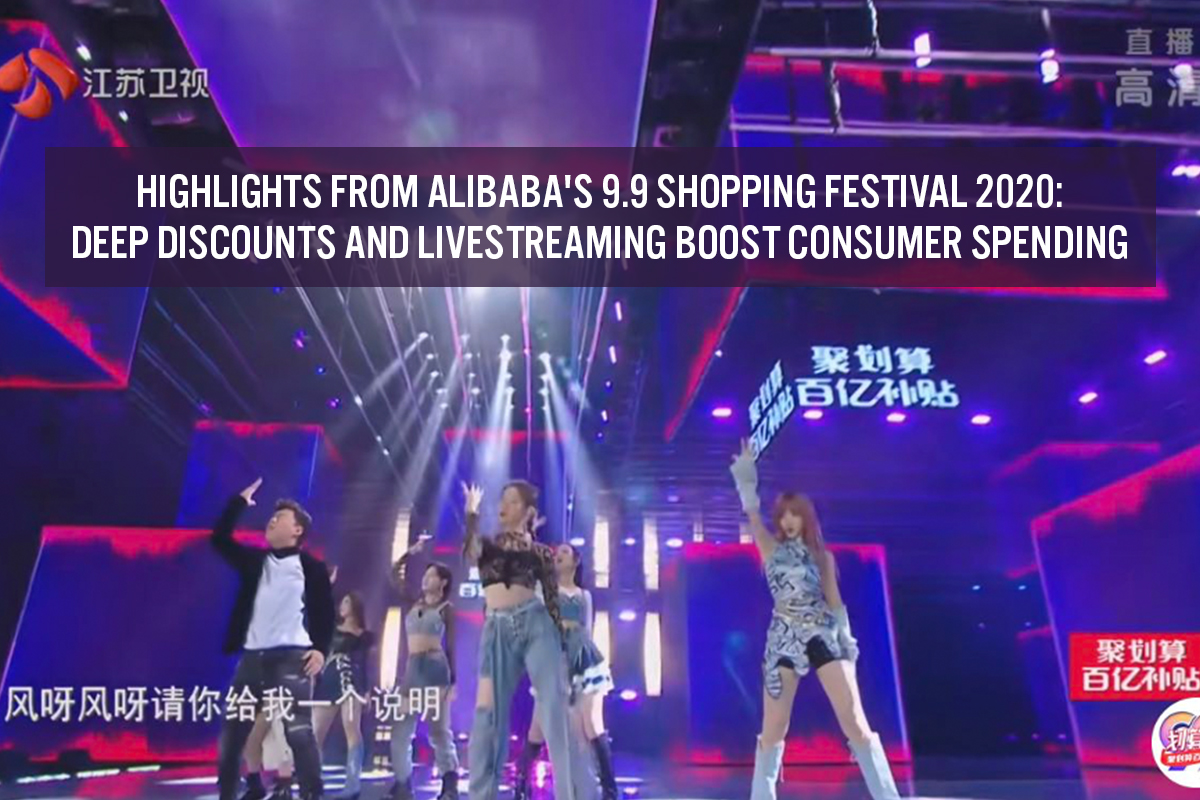
Nitheesh NH
What’s the Story?
The 9.9 Shopping Festival in China was first created by Alibaba back in 2016 as an online wine festival on September 9. In 2019, Alibaba upgraded the event and named it “9.9 Juhuasuan Bargain Festival,” hosting it on the Juhuasuan platform. The 9.9 event has become the company’s third-most important online shopping festival, following Singles’ Day and the 6.18 Midyear Shopping Festival. In this report, we highlight the marketing and sales strategies that Alibaba implemented to boost sales during the 9.9 Juhuasuan Bargain Festival this year, in the wake of the Covid-19 crisis.Why It Matters
The 9.9 event falls between two of China’s largest online shopping festivals—6.18 in June and Double 11 (Singles’ Day) in November. In 2019 and 2020, 9.9 took place on Juhuasuan, Alibaba’s sales and digital marketing platform that hosts flash sales and group-buying. Using analytics and personalized recommendations on Juhuasuan, brands and retailers could offer the most relevant products to their targeted regional consumers. The platform was revamped by Alibaba in 2019 and repositioned as the top destination for Chinese consumers, especially those in lower-tiered cities, who are looking for quality products at affordable price. In Alibaba’s most recent quarterly earnings report, the company stated that its new user growth on Taobao and Tmall was fueled by customers from less-developed areas. This year, brands and retailers are facing unprecedented challenges due to the Covid-19 crisis, with retail sales falling sharply when the pandemic hit China. Retail sales in China plunged 20.5% in the months of January and February and only returned to year-over-year growth—of just 0.5%—in August, according to the National Bureau of Statistics. Chinese e-commerce giants are using shopping festivals to boost sales in the recovery period. Taking place before Singles’ Day, 9.9 also provides an opportunity for brands and retailers to attract customers and test different marketing and sales strategies before the largest shopping extravaganza of the year.The 9.9 Juhuasuan Bargain Festival: In Detail
The 9.9 Juhuasuan Bargain Festival kicked off its pre-sale period on September 1, when shoppers could view products on promotion and put down deposits. The official sale period ran from September 9 to 11. Compared to the timeline of last year’s event, the official sale period was extended by one day in 2020. According to third-party data company ECdataway, GMV generated from the 9.9 Juhuasuan Bargain Festival 2020 (September 1–11) exceeded ¥80 billion ($11.7 billion), an increase of 55% compared to last year (September 1–10, 2019). Even accounting for the festival’s extension, the average single-day GMV was 40.9% higher this year. Looking at categories, “consumer electronics” and “clothing, footwear and accessories” accounted for the greatest shares of GMV. The latter category also saw the highest year-over-year growth in GMV (see Figure 1). [caption id="attachment_116375" align="aligncenter" width="700"]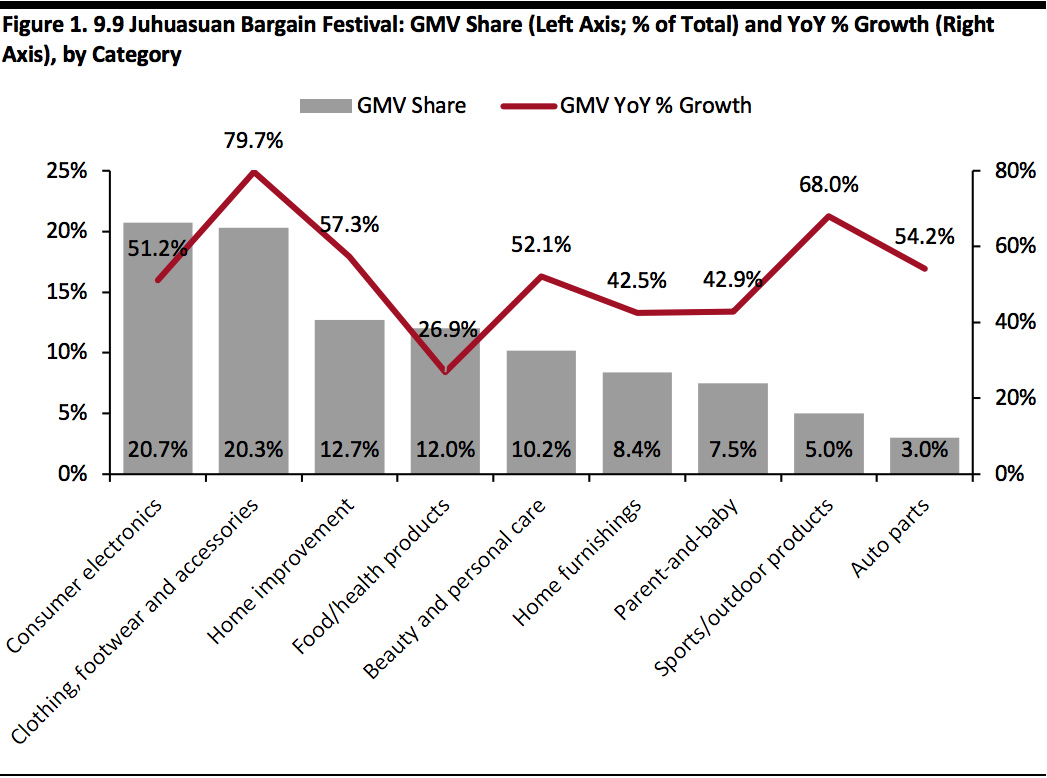 *GMV growth for the period September 1–11, 2020 compared the GMV generated during September 1–10, 2019
*GMV growth for the period September 1–11, 2020 compared the GMV generated during September 1–10, 2019Source: ECdataway[/caption] ECdataway reported that there were 46 brands that exceeded ¥100 million ($14.6 million) in GMV this year, almost half of which are consumer electronics brands, and over 30 are domestic brands. International brands that hit the ¥100 million ($14.6 million) mark during the festival include Adidas, Apple, Converse, FILA, HP, Lancôme, L’Oreal, NIKE, Panasonic, Phillips, Skechers, SK-II and Uniqlo. Combination of Live Entertainment and Livestreaming Alibaba has been hosting galas as part of its shopping festivals since 2015, with the goal of combining entertainment with commercial sales. In 2019, the Tmall Double 11 Gala—which had Chinese and international singers and celebrities attending, and performing during, the event—attracted an online audience of 51.4 million. This year, the 9.9 Juhuasuan Bargain Festival Gala was broadcast on September 9. It gained 85 million views across 16 video-streaming platforms. In addition to performers, Alibaba selected three Chinese celebrities—Liu Tao, Jing Tian and Li Hao—as the official livestreaming ambassadors of Taobao Live (Alibaba’s livestreaming platform), inviting them to host livestreaming sessions during the Gala. The primary stage of the Gala and the livestreaming studios were in the same venue, so the performances and livestreaming sessions were shown to viewers alternately. Viewers who were interested in buying featured products could open the Taobao app to enter the livestreaming session on Taobao Live to purchase the items. The setting of the stage also allowed celebrities who had finished performing to join the livestreaming session to promote products, send coupons and engage with viewers. [caption id="attachment_116376" align="aligncenter" width="700"]
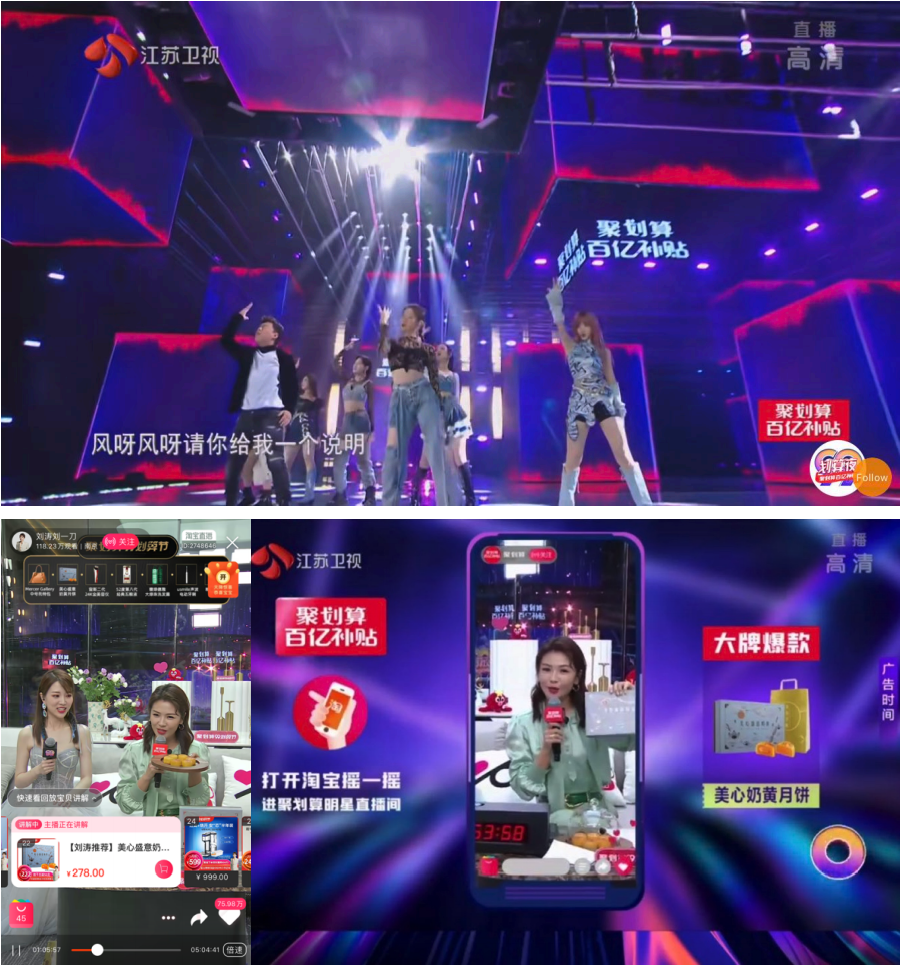 9.9 Juhuasuan Bargain Festival Gala 2020 and livestreaming sessions
9.9 Juhuasuan Bargain Festival Gala 2020 and livestreaming sessionsSource: Weibo/Taobao Live[/caption] Livestreaming continues to be an effective way to interact with customers and stimulate sales during shopping festivals. Celebrity livestreaming was the focus of this year’s 9.9 event. Juhuasuan invited Chinese celebrities to host livestreaming sessions almost every single day during the pre-sale period. On September 9, the three ambassador-hosted livestreaming sessions attracted 15 million views in total and featured “Hot Products” that were restocked more than four times on average during the sessions. Extensive Subsidies and Discounts To Provide Low-Priced Items This year, the promotional level was higher compared to the event in 2019. In terms of discounts, Juhuasuan offered subsidies worth ¥10 billion ($1.5 billion) for consumers, which were in the form of cash coupons of ¥30 ($4.39) on orders of over ¥300 ($43.90). This level of discount is roughly the same as last year (¥20 ($2.81) discounts on orders of over ¥200 ($28.11)). In addition, Juhuasuan offered deals such as 50% discounts on selected products in the first hour of the event, 500,000 “Hot Products” priced at ¥9.90 ($1.50), buy-one-get-one-free deals and more. Alibaba’s 88 VIP members also enjoyed an extra 5% off. Discounts on some products reached nearly 70% (see Figure 2). Several popular beauty products among Chinese consumers—SK-II’s Treatment Essence and YSL lipsticks, for example—were offered at unprecedented low prices. Consumer electronics, which was the best-selling product category this year, also offered many good deals for consumers. [caption id="attachment_116377" align="aligncenter" width="700"]
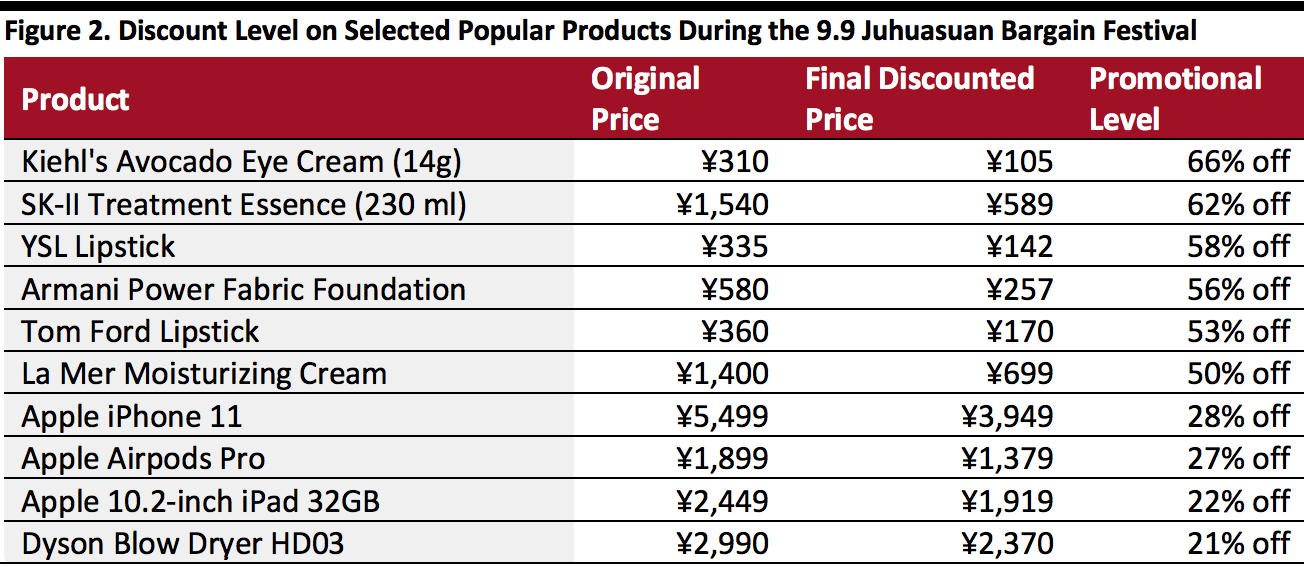 Source: Juhuasuan[/caption]
Source: Juhuasuan[/caption]
Gamification During the Festival
Gamification is an effective way to entertain users and increase user stickiness. Alibaba has been leveraging its gaming platforms to help brands promote their products and improve customer engagement. It also introduces a new game for almost every one of its shopping festivals, to gamify the shopping process. For this year’s 9.9 event, Juhuasuan launched a new game called Octopus Treasure Box (the octopus is Juhuasuan’s mascot). Users could participate in the game during the period September 1–11. Users could receive treasure boxes on each day that they logged into the game, giving them the chance to receive a red packet. Users could also complete certain tasks to get more treasure boxes, such as viewing a 15-second promotional video. On the morning of September 9, Juhuasuan revealed the actual, varied amounts that each red packet was worth, which could be redeemed as discounts on purchases through the Juhuasuan platform. [caption id="attachment_116378" align="aligncenter" width="700"]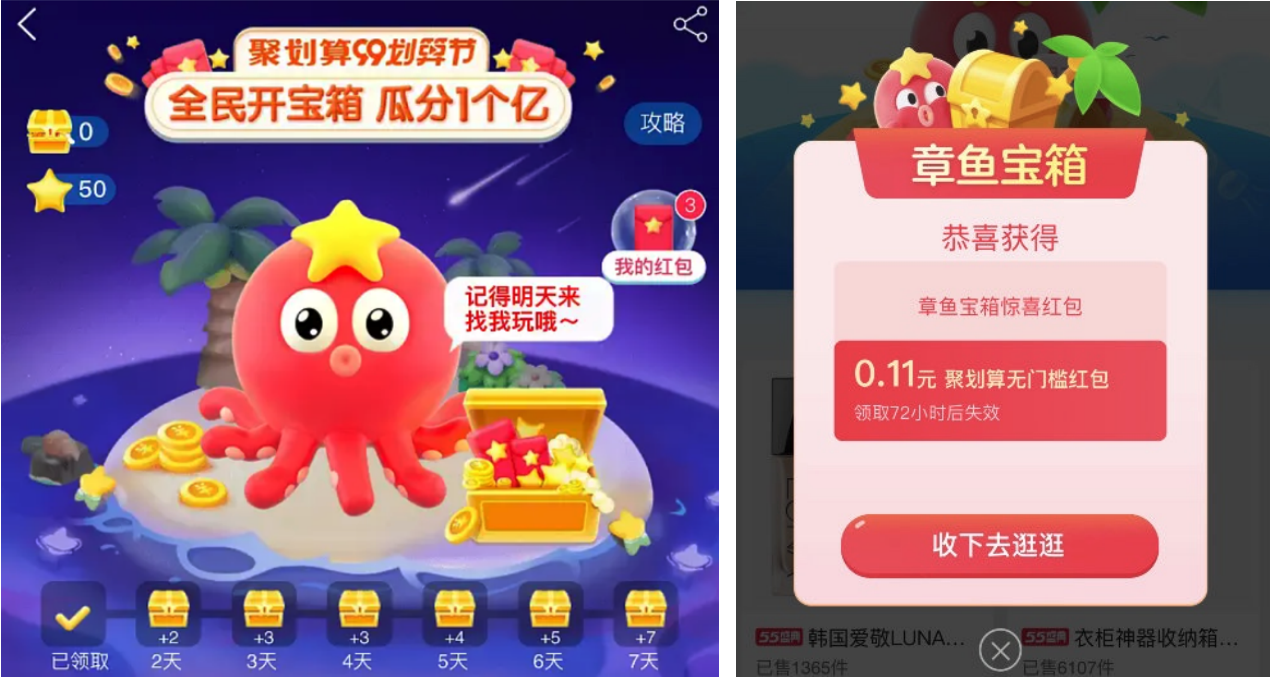 Source: Weibo[/caption]
Source: Weibo[/caption]